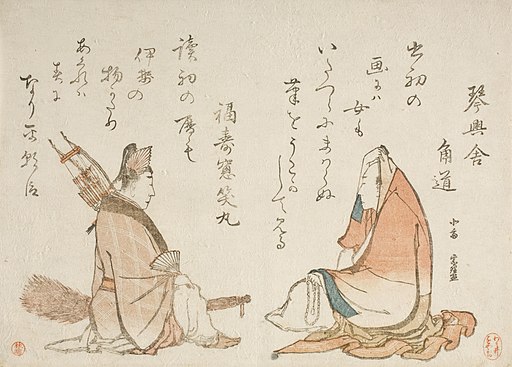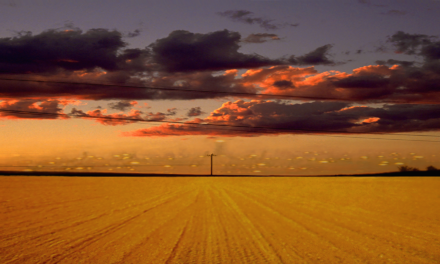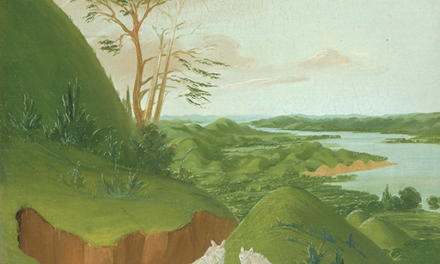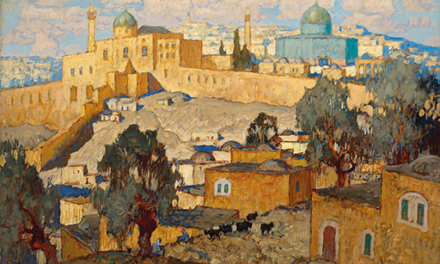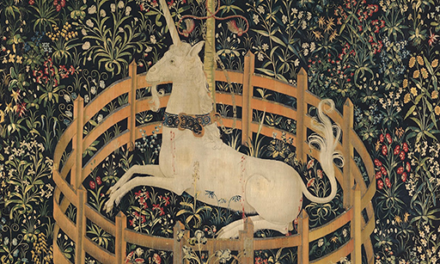Hokusai, Katsushika. Two Kyoka Poets: Kinkosha Karomichi; Fukujuso. 1796, Los Angeles County Museum of Art, Los Angeles.
Poetry, Commerce and Flounder Sherbet
by Colin Dodds
Meeting for the first time, Ed Smith and I made an odd pair – the only white guys in the basement restaurant of the Kitano Hotel on Park Avenue in Manhattan. I was 27, in a t-shirt and sweater, and Ed about twenty years older, in a suit fitted for a man twenty pounds heavier, with a corporate-blood red tie and a ragged beard. The room was all cream and tan, sparsely decorated. It was 2004 and Ed was a poet of some renown, trying to sell me on a book he hoped would advance his management-consulting business. I had a small press with some friends.
“Information is the substance of the universe,” he said. “I feel like artists and poets know more about information than they give themselves credit for.”
Ed’s consultancy was based on his experience as a poet and the teachings of W. Edwards Deming, often credited as the mind behind the rise of postwar industrial Japan. He brought me a book on Deming, along with a copy of Sappho with his consulting company’s logo affixed to it, and a bunch of other books and papers. He took out his materials one at a time – he had a plan.
As the waitress delivered the fourth course, one of the Japanese businessmen at the next table took an interest, and asked what we were having. Ed Smith told him “the kaiseki dinner,” and the man raised his eyebrows, laughing that it was more than he could afford.
The extravagance of the meal caught me off guard. Five-hundred-dollar dinners have never been a big part of my life. My publishing outfit was the venture of a handful of friends loaning each other the same twenty dollars for drinks. Rather than twelve-courses of delicacies, dinner was mostly passed to me by a dead-eyed cashier through the bulletproof glass of the local Chinese takeout.
But to Ed, I seemed a good prospect. I was a poet who was conversant with business, working days as a financial journalist. We’d met after I’d published his friend’s book of short stories.
The kaiseki dinner unfolded gracefully – soup with tiny blooms of green oil, scoops of flounder sherbet, small plates with delicate mushrooms carefully arranged and vivid slivers of sashimi. It made me nervous, and I warned Ed about my limited resources. But he was undeterred, and insisted that dinner was on him. Although I wasn’t raised to lie, I was raised by a practical father, a salesman, who stressed the importance of having options. And I may have been slow to correct anyone who took a grandiose view of my enterprise.
As small plates and bowls came and went, Ed took me through his poetry books, a few catalogues from his wife’s art exhibits, along with photographs and press clippings from the Beyond Baroque poetry scene in Los Angeles in the ‘80s, with Dennis Cooper, Bob Flanagan and Amy Gerstler.
Ed was earnest and open, a little raw, almost childish in his excitement and lack of guile. Though older, he was like me, a poet, outside of academia, still surviving, still trying for something. Ed had decided to wholeheartedly devote his experience and abilities as a poet to the tender mercies of corporate America. It seemed courageous to me.
But I didn’t want to publish Ed’s management-consulting book. I was a poet and considered my day job, and even my part in the publishing company, as footnotes to that vocation. I didn’t want to spend my “free” time on a business book.
The sake poured, and at one point, I offered to put out a book of Ed’s poems. He demurred and said he was putting “everything ‘poetry’” into his consulting business.
As for what inspired Ed’s consulting business, I don’t know. Maybe he heard in all the techno-utopian rhetoric of the early internet days a call to action: Big business was ready to listen to a poet. I wondered if he was tired, and trying to cash in the chip that he had as a poet who had some recognition. I couldn’t guess what it was like for Ed the consultant. But I can say after a brief stint as the cofounder of a short-lived ad agency, that cold-calling for meetings and walking into those offices alone to tell a story that’s essentially your own is a brutal, skinned-alive-type proposition for a sensitive person. Ed was a sensitive person.
Our conversation bounced from quantum physics to the relationship of math and poetry to the future of business, touching down everywhere in between. He told me about a health problem affecting his liver, and a time, suffering from extreme depression and close to being fired from Viacom, when he used the company directory to call 60 Minutes host Mike Wallace. After a short conversation, Wallace made sure Ed had medical leave and all appropriate care.
There was a darkness to Ed, but it was a shadow common to everyone I knew back then – a kind of personal scorched-earth policy that suffused the music, the drug use and casual alcoholism, the surly backward look at whatever was left behind on the way to New York.
By the end of the meal, I agreed to look at the business book when he finished it. Ed put down his Amex Gold card without looking at the bill. We walked up Park Avenue to catch the subway. It was a cold night. When we parted ways on the concourse level of the Grand Central subway station, I said something half-hearted about his book. He gave me a big hug and said “I hope so. I’m $100,000 in debt.”
It gutted me to hear. When I told the story to my friends, that was the punchline: How we were both bluffing in the basement of the Kitano Hotel – him as a successful entrepreneur, and me as a successful publisher. It was funny in the laugh-or-you’ll-cry sense.
Ed and I scheduled and rescheduled plans for another dinner – this time on me, I promised. But it didn’t happen. He invited me to a few art openings. A colleague interviewed him for another friend’s magazine. Along the way, my publishing company shut down, as did some of the friendships.
Three years later, in 2008, after a reading at a Chelsea gallery, I went to introduce myself to Dennis Cooper, a well-known poet. I was a little agitated from the poetry, the sitting still and the little plastic cups of wine. By way of an introduction, I told Dennis that I knew his friend, Ed Smith. Dennis gave me a sour look and told me that Ed had killed himself. Stunned by the news and ashamed at trading on the name of a man I knew so little, I had nothing to say except “I’m so sorry I to hear it.”
In the basement of the Kitano Hotel that night, Ed’s stories and struggles, and his new enterprise mattered to me because they spoke to my own future, and my own prospects, and what I might expect living somewhere between poetry and corporate America. If Ed’s suicide was a warning about one, I still haven’t figured out about which one. Ed was only six years older than I am now.
To Ed that night, I was an opportunity, and I’ve learned what it is to build up an opportunity and have it come to nothing. It’s something I’ve come to know like I know my own face in the mirror. I’ve also learned how these disappointments accumulate. And I was one of Ed’s last few.
When I think about Ed, I think of his poetry – light and fun at first blush, concealing sharp teeth. One poem, titled just DIALOGUE, stuck with me through the years:
1st VOICE: Do you understand each of these rights as I have explained them to you?
2nd VOICE: No.
1st VOICE: No? What is it that you don’t understand.
2nd VOICE: Well for one thing you said anything I say can and will be used against me in a court of law which means anything I say can be used against me in a court of law AND that anything I say will be used against me in a court of law. Let me repeat that last part: anything I say will be used against me in a court of law. Now suppose what I say just can’t be used against me in a court of law; you’ve already told me it can and will. That doesn’t make any sense and I don’t understand.
1st VOICE: Well, Mr. Smith, congratulations. You’ve identified and solved the riddle of the Miranda Rights. You are free to go.
2nd VOICE: Gosh, thanks. Can I keep the handcuffs?
The poem made me laugh when I read it on the subway fourteen years ago, and still does. It’s funny because, from a practical standpoint, it’s completely untrue. But it’s also true. We’re all in trouble: Happiness is fleeting; there’s never enough money, and we will die. Still, maybe there’s an answer to the riddle, hidden in the few rights that remain. Maybe the crushing powers of money, law and mortality left a door unlocked for the criminal who asks the right questions, with an incredible mercy just beyond.
Colin Dodds is a writer with several acclaimed novels and poetry collections to his name. He grew up in Massachusetts and lived in California briefly, before finishing his education in New York City. He’s made a living as a journalist, editor, copywriter and video producer. Colin also writes screenplays, has directed a short film, and built a twelve-foot-high pyramid out of PVC pipe, plywood and zip ties. He lives in New York City, with his wife and daughter. You can find more of his work at thecolindodds.com.

